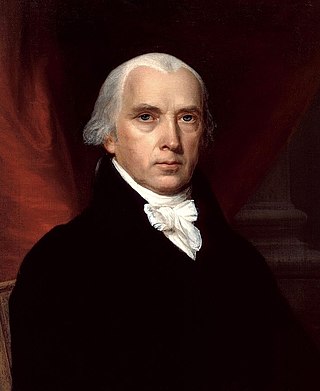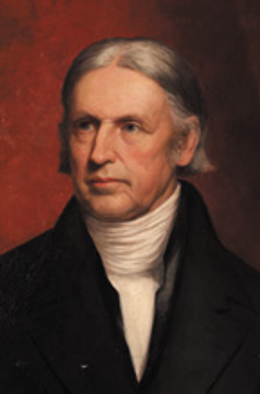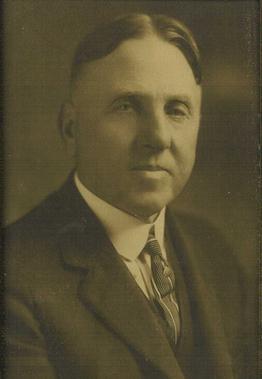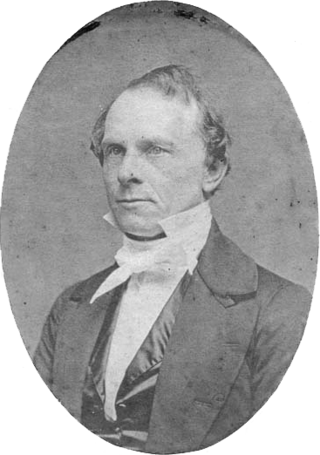
Presidential elections were held in the United States from November 2 to December 5, 1804. Incumbent Democratic-Republican president Thomas Jefferson defeated Federalist Charles Cotesworth Pinckney of South Carolina. It was the first presidential election conducted following the ratification of the Twelfth Amendment to the United States Constitution, which reformed procedures for electing presidents and vice presidents.

Presidential elections were held in the United States from November 4 to December 7, 1808. The Democratic-Republican candidate James Madison defeated Federalist candidate Charles Cotesworth Pinckney decisively.

Hosea Ballou D.D. was an American Universalist clergyman and theological writer.

The Universalist Church of America (UCA) was originally a Christian Universalist religious denomination in the United States. Known from 1866 as the Universalist General Convention, the name was changed to the Universalist Church of America in 1942. In 1961, it consolidated with the American Unitarian Association to form the Unitarian Universalist Association.

Richard Eddy, D.D. was an American Universalist clergyman, born at Providence, R. I. He was a chaplain of the Sixtieth New York Volunteers during the American Civil War. From 1877 to 1906 he was president of the Universalist Historical Society and from 1886 to 1891 he was editor of the Universalist Register.

Amory Dwight Mayo was a Christian clergyman and educator.
The Crane Theological School was a Universalist seminary at Tufts University founded in 1869 as the Tufts College Divinity School and closed in 1968. It was one of three Universalist seminaries founded in America during the nineteenth century, along with the Theological School of St. Lawrence University and the Ryder Divinity School at Lombard College. During its history, it granted 281 Bachelor of Divinity degrees, 152 Bachelor of Sacred Theology degrees, and two Masters of Religious Education, for a total of 435 degrees.

Charles Clinton Beatty was a Presbyterian minister, seminary founder, and academic philanthropist.

Liberty Universalist Church and Feasterville Academy Historic District is a national historic district located near Winnsboro, Fairfield County, South Carolina. The property encompasses four buildings constructed between 1831 and 1845. They are the Liberty Universalist Church and three buildings associated with the Academy: a boarding house, a kitchen, and a school building. The buildings were constructed by the Feaster family.
Thomas Baldwin Thayer was the leading Universalist theologian in the late nineteenth century.

Thomas Whittemore was a Christian Universalist author, speaker and influential member of the Universalist Church of America. He founded and was the editor of The Trumpet and Universalist magazine, which succeeded the Universalist magazine of Hosea Ballou in 1828.

Caroline A. Soule, was an American novelist, poet, religious writer, editor, and ordained Universalist minister, who was in 1880 the first woman to be ordained as a minister in the United Kingdom; first president and one of the founders of the Woman's Centenary Aid Association, the earliest national organization of American church women; and the first Universalist Church of America missionary when sent to Scotland in 1878.

Rev. Irving Clinton Tomlinson was an American Universalist minister who converted to Christian Science, becoming a practitioner and teacher. For a time, he lived as one of the workers in the household of church founder, Mary Baker Eddy, later writing a book about his experiences called Twelve Years with Mary Baker Eddy.

Lyman Ward was a Universalist minister who founded the Southern Industrial Institute and who was nominated by the Alabama Republican Party for Governor of Alabama in 1946.

Richard Falley Cleveland was an American Congregationalist and Presbyterian minister. A graduate of Yale College and Princeton Theological Seminary, Cleveland spent most of his life as a pastor, outside of a brief period as a district secretary for the American Home Missionary Society. He was the father of Grover Cleveland, who served as President of the United States twice.

The Clinton Liberal Institute was a preparatory boarding school established by the Universalist Church in the village of Clinton, in the Town of Kirkland, New York, in 1831. Its main building, a massive stone structure, was the largest building in Clinton for many years. It relocated to Fort Plain, New York, in 1878, taking over the former Fort Plain Seminary, and remaining there until its buildings were destroyed in a fire in 1900.

Caroline M. Sawyer was a 19th-century American poet, writer, and editor. Her writings ranged through a wide variety of themes. Born in 1812, in Massachusetts, she began composing verse at an early age, but published little till after her marriage. Thereafter, she wrote much for various reviews and other miscellanies, besides several volumes of tales, sketches, and essays. She also made numerous translations from German literature, in prose and verse, in which she evinced an appreciation of the original. Sawyer's poems were numerous, sufficient for several volumes, though they were not published as a collection.

Lorenza Haynes was an American librarian, minister, school founder, suffragist, and writer.

Mary Traffarn Whitney was an American minister and editor, as well as a social reformer, philanthropist and lecturer. She was one of the early Universalist women ministers, later changing her association to that of the Unitarian church. Whitney was the author of Honor between men and women (1896), FamilyCulture, the Science of Human Life (1897), Present Tendencies in Racial Improvement (1897), Hymns of Peace (1915), and Problems for seniors by a senior (1932).
Stephen Rensselaer Smith was a minister of the early Universalist Church in New York.

















